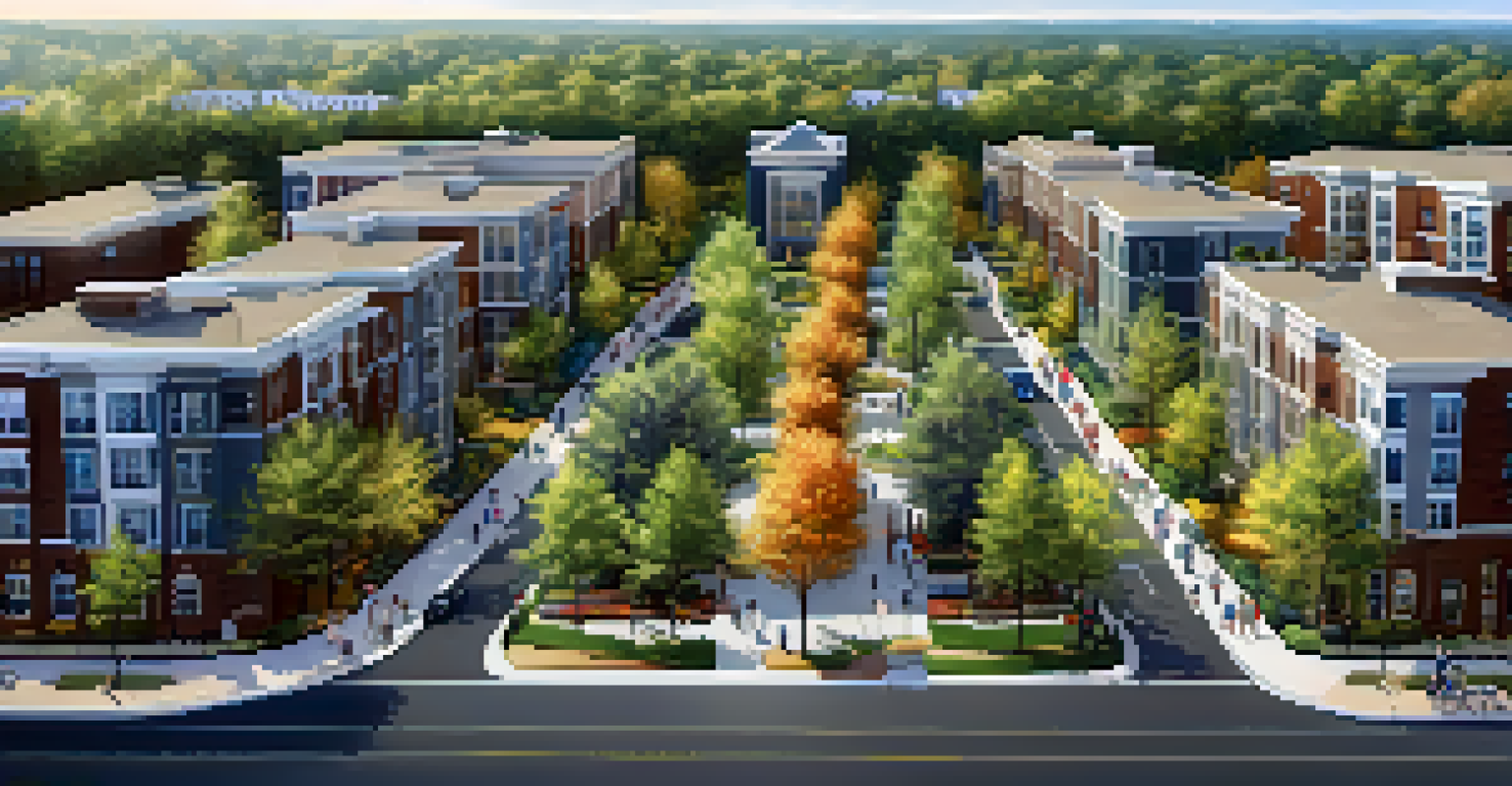Real Estate Trends and Their Effect on New Jersey's Economy

Understanding New Jersey's Real Estate Market Landscape
New Jersey's real estate market is a dynamic tapestry that reflects broader economic trends. With its proximity to major cities like New York and Philadelphia, the state has become a hotspot for both residential and commercial investments. The demand for housing and office spaces continues to rise, driven by factors such as population growth and urbanization.
Location, location, location! This adage is central to real estate, and it’s particularly relevant in New Jersey's market where proximity to urban centers drives property values.
However, this vibrant market is not without its challenges. Rising home prices and inventory shortages can make it tough for first-time buyers to find affordable options. Additionally, the commercial sector faces shifts as more people embrace remote work, prompting businesses to rethink their space requirements.
Overall, understanding the nuances of New Jersey's real estate market is crucial for stakeholders, from buyers to investors. By keeping a close eye on these trends, they can make informed decisions in a rapidly changing environment.
The Influence of Remote Work on Housing Demand
The shift to remote work has dramatically reshaped housing demand across New Jersey. More people are seeking homes that offer space for home offices, leading to increased interest in suburban and rural areas. This trend is pushing up property values in regions previously considered less desirable.

As families prioritize space and amenities, towns with good schools and parks are becoming particularly attractive. This shift not only affects residential listings but also influences local economies as these areas see an influx of new residents eager to invest in their communities.
Remote Work Shapes Housing Demand
The rise of remote work is driving demand for homes with office space, particularly in suburban areas.
In essence, remote work is not just a temporary change; it’s redefining what home means for many. As the workforce adapts, so too does the real estate landscape, with lasting implications for New Jersey's economy.
Commercial Real Estate: Challenges and Opportunities
New Jersey's commercial real estate sector is navigating uncharted waters as businesses adapt to new ways of working. While some industries have downsized their office spaces, others are looking for flexible options that cater to hybrid models. This creates both challenges and opportunities for commercial landlords.
The best way to predict the future is to create it.
For example, the demand for co-working spaces is on the rise, as startups and freelancers seek affordable, flexible environments. Landlords who can pivot and offer these modern solutions may find themselves thriving amidst the uncertainty. Conversely, those clinging to traditional models may struggle.
The key takeaway here is that adaptability is vital. As businesses continue to evolve, commercial real estate must also innovate to meet the changing needs of the workforce and the economy.
Impact of Interest Rates on Real Estate Investment
Interest rates play a significant role in shaping New Jersey's real estate investment landscape. When rates are low, borrowing costs decrease, making it more attractive for individuals and businesses to invest in properties. This can lead to increased buying activity and higher prices in the market.
Conversely, when interest rates rise, potential buyers may hesitate, fearing higher monthly payments. This often results in a slowdown in transactions, which can impact the overall economy by reducing construction activity and employment in real estate-related sectors.
Interest Rates Impact Investments
Low interest rates encourage real estate investment, while higher rates can slow down buying activity.
Investors must stay informed about interest rate trends to navigate the market effectively. Understanding how these rates affect purchasing power can help them make smarter, more strategic decisions.
The Role of Technology in Real Estate Transactions
Technology is transforming the way real estate transactions are conducted in New Jersey. From virtual tours to online listings, buyers and sellers have more tools at their disposal than ever before. This not only streamlines the buying process but also expands the market reach for sellers.
Additionally, technology enables better data analysis, allowing investors to make informed decisions based on market trends and property values. This shift is democratizing access to real estate investment opportunities, empowering a broader range of participants in the market.
Ultimately, embracing technology in real estate transactions is not just a trend; it's becoming a necessity. Those who adapt quickly will likely reap the rewards in a competitive landscape.
The Importance of Sustainable Real Estate Development
Sustainability is becoming increasingly important in New Jersey's real estate development scene. Buyers are now more conscious of environmental impacts, often opting for eco-friendly homes and commercial spaces. This shift toward sustainability is reshaping the types of properties that are in demand.
Developers who prioritize green building practices not only appeal to environmentally conscious consumers but also often qualify for tax incentives and grants. This can lead to long-term cost savings and enhanced property values, creating a win-win situation.
Sustainability Drives Development Trends
Increasing consumer demand for eco-friendly properties is reshaping New Jersey's real estate development landscape.
As the focus on sustainability continues to grow, it will play a crucial role in shaping New Jersey's real estate market and, by extension, its economy. Stakeholders need to embrace this trend to remain relevant and competitive.
Future Predictions for New Jersey's Real Estate Market
Looking ahead, New Jersey's real estate market is poised for continued evolution. With ongoing shifts in work habits, technology integration, and sustainability efforts, the landscape will undoubtedly change. Experts predict a blend of urban and suburban living, with mixed-use developments becoming more common.
As housing demands evolve, we may see a rise in multi-family units and affordable housing projects as local governments respond to community needs. This could help alleviate some of the inventory shortages currently plaguing the market.

In summary, while challenges remain, the future holds promise for New Jersey's real estate sector. By staying aware of these trends, investors and homeowners alike can navigate the market with confidence.